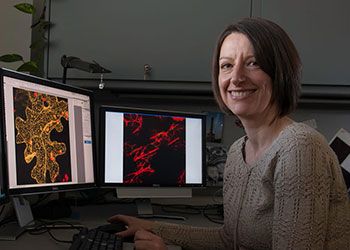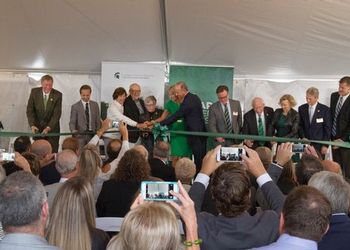A closer look
How an endowment is making MSU an experimental physics powerhouse
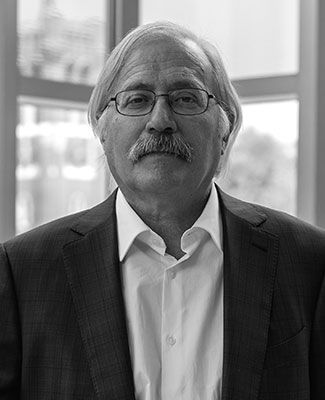
A closer look
How an endowment is making MSU an experimental physics powerhouse
November 10, 2023Think back to the people who raised you—your parents, guardians, close family members. The adult figures who saw you off to school every morning, made sure you had dinner every night and spent the hours in between at work. Doing a job.
It may have taken you years to develop a full understanding of what your parental figures did for work, whether they enjoyed it, whether they found it fulfilling…whether their time at the proverbial “office” was remarkable in any way.
Randy Cowen has known for a long time that his dad’s career was remarkable.
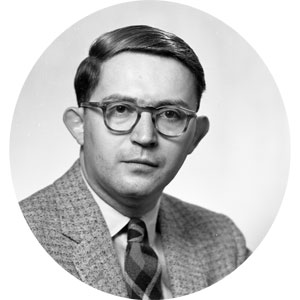 Professor Jerry Cowen earned his doctorate in physics from MSU in 1954, joined the physics department as a professor the following year, and spent the entirety of his 44-year teaching and research career at MSU.
Professor Jerry Cowen earned his doctorate in physics from MSU in 1954, joined the physics department as a professor the following year, and spent the entirety of his 44-year teaching and research career at MSU.
His devotion to MSU—his research, his students and his department—and the joy it brought him was very clear to his family, and in 2000, shortly after his passing, his son Randy made a gift to MSU to honor his legacy.
“I saw both through his love of teaching and research what great faculty members can mean to a university and to the students,” Randy says. “I wanted to do something to honor his values and my values by helping MSU attract great faculty members to the physics department, to continue doing what my father had done so well both in research and in teaching.”
In that vein, Randy’s gift created the Jerry Cowen Endowed Chair of Experimental Physics, which today provides financial support to promising young researchers in physics over a period of five years, as they grow their own research and make their academic home here at MSU in the field that Jerry Cowen loved.
Good for the Field
We know this to be true: Endowed faculty positions are good for the university.
They are a tool that helps MSU recruit outstanding people from other top-tier institutions around the country and the world, they are a means of recognizing the great work of faculty members who are already here, and they are a way to help promising researchers at any point in their careers to really dig into the work that excites them most.
Funding from an endowed position can mean consistent, reliable seed money to tackle big ideas, explore new areas, launch a new project, invent something and earn recognition from institutions outside the university (which often leads to more funding later on). It can mean adding personnel to a research team—hiring a colleague, supporting a grad student or offering a paid research assistant opportunity to a promising undergraduate. It can mean more opportunities to get out in the field, wherever the field happens to be.
But endowed positions are also good for the field—especially fields that rely heavily on experimentation.
Because the more experiments are done, the more new avenues there are to explore, and the bigger the field gets.
And that’s where the Jerry Cowen Endowed Chairs come in.
Matthew Comstock and Johannes Pollanen both joined MSU as assistant professors and were the first two faculty members for whom the Cowen Chair position helped launch lengthy and fruitful careers at MSU—both having recently been promoted to associate professors with tenure.
Comstock was the first, joining MSU in 2012 and building up a research group focused on investigating physical processes in biology through the use of advanced, precision single-molecule measurement and manipulation.
Pollanen arrived in 2016 and immediately launched the Laboratory for Hybrid Quantum Systems, where he and his team are focused on exploring the fundamental physics and potential quantum information science applications of low-dimensional quantum electronic materials and devices.
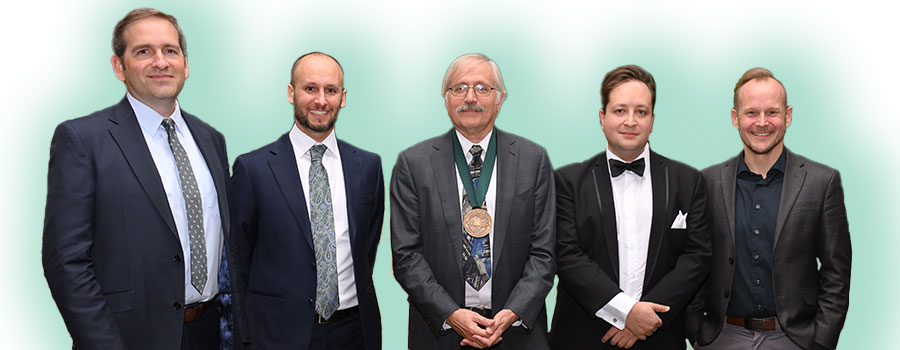
Drawing Attention
Tyler Cocker and Jonas Becker are the Cowen Chairs currently receiving support from the endowment.
Cocker came to MSU in 2018, and even before he arrived, he’d already made a significant contribution to the field of experimental physics.
As part of his Ph.D., which he earned in 2012, he and colleagues invented the field of terahertz scanning tunneling microscopy (THz-STM). The methods they developed enabled them to observe and record what happens to single molecules and the individual atoms of solid materials under the influence of terahertz waves, which, until recently, were a notoriously inaccessible range of waves that occur in the liminal space on the spectrum between microwaves (which are generated by electronics) and visible waves (which are generated by photonics). This work lays the groundwork for novel technologies in quantum physics, molecular electronics and nanotechnology.
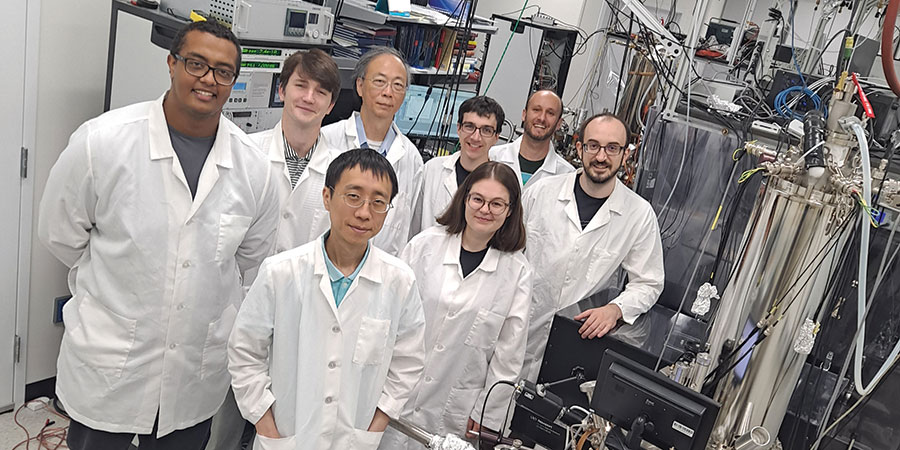
Funding from the Cowen Chair—which Cocker was awarded in fall 2019—enabled him to assemble what he calls the “super team” that helped launch his lab. He brought on his former research partner Vedran Jelic as a postdoc and was also able to offer financial support to his lab’s first Ph.D. student, Eve Ammerman.
And, unsurprisingly, with the lab up and running so quickly, success followed. Members of the team earned poster, presentation and teaching awards; they published papers; and Cocker himself was awarded the 2021 Young Scientist Award from the Infrared, Millimeter and Terahertz Wave Society and a Young Investigator award from the Army Research Office. And—as any researcher will tell you—funding begot funding. The lab began receiving grants from the Office of Naval Research and the Air Force Office of Scientific Research, among others.
“What allowed us to really kickstart things and get set up really quickly and generate these results that led to getting us funding was having the Jerry Cowen Endowed Chair in the first place. Of course everybody wants to fund it once it works!” Cocker joked at his endowed faculty investiture, which took place belatedly in 2022 due to the pandemic.
But in all seriousness, he credits Cowen’s support for the atmosphere he has been able to foster in his lab.
“The generous support of Randy Cowen is helping to nucleate new projects in my lab in the spirit of curiosity-driven physics research. Of all the components that go into a state-of-the-art research lab, the vibrancy and creativity of motivated graduate students and postdocs is the most important, and Randy’s gift enables them to thrive.”
Lighting Up the World
Jonas Becker can say the same. He came to MSU in 2021 and leads the Solid-State Quantum Optics group, where he and his team use optical- and microwave-based methods to study and control the interactions of light and matter.
In a presentation at his investiture ceremony in 2022, he used the beloved Star Wars Jedi weapon of choice, the lightsaber, as an example of what his team is working on. While they’re not actually making lightsabers (it seems that sort of technology is still a long way off), they are finding ways to imitate what the light in the lightsaber is capable of doing: stopping at a certain point and interacting in a particular way with other light.
Their findings are being used to build quantum computers that vastly outperform classical computers. Where classical computers operate on “bits” (which can only encode information as 0s and 1s), quantum computers operate on “qubits,” which can encode information not only as 0s and 1s, but also as arbitrary superpositions of 0s and 1s, granting much more flexibility in terms of what problems a computer is able to solve and how quickly it is able to solve them.
“I really don’t think I’m exaggerating if I say that we’ve created a really unique environment and infrastructure here to do this kind of research,” Becker said at his investiture ceremony in 2022. “None of this would’ve been possible without the generous support of MSU—of course—but it especially would not have been possible without the support of Randy and the Cowen family. We are incredibly grateful for the opportunities that it has opened up.”
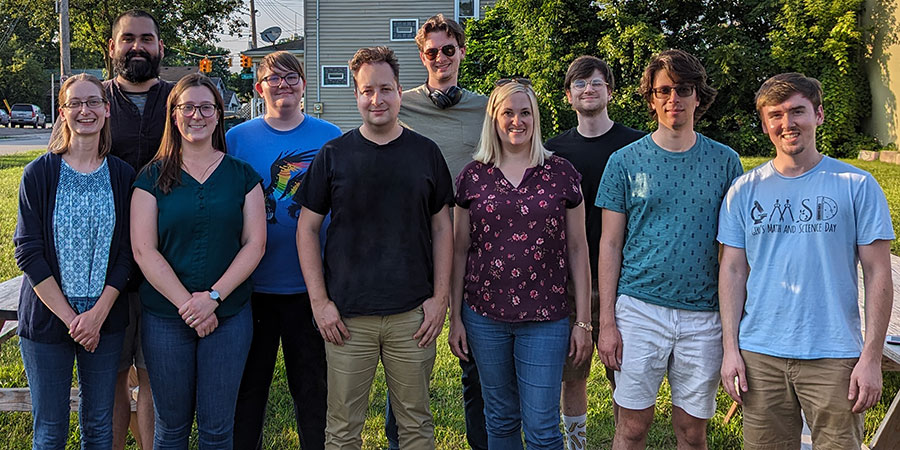
An Experimental Physics Ecosystem
Other than their titles as Jerry Cowen Chairs of Experimental Physics, there is something else that the four Cowen Chairs share: a very palpable enthusiasm for their work. An enthusiasm that is almost as important to the field as the work itself, because while it certainly contributes to a researcher’s productivity, it also creates an environment that is ripe for mentorship. It is the proverbial welcome mat that draws the next generation of researchers with big ideas into experimental physics.
Collectively, Comstock and Pollanen’s labs boast more than 50 alumni—from undergraduate research assistants and exchange students, to graduate students pursuing master’s or doctoral degrees, to postdocs—whose experiences at MSU will help shape the course of their careers and further broaden the field.
Cocker’s lab celebrated the graduation of its first Ph.D. student in December 2022, and with several other Ph.D. students and an undergrad or two on the roster, there will be more to follow.
And Becker unequivocally credits the early and rapid success of his lab to the “amazing team of students” the lab has assembled to help get things up and running.
They all take pride in sharing and opening up their field to students—the same way Jerry Cowen did.
“Talking to students who had my father as a professor, or were his graduate students,” Randy says, “I got a sense from them about how meaningful it was to have a special professor, either teaching them or working with them in research, and what impact it had on their lives both in the short term as a student and in the long term through their whole careers. It made it clear to me that attracting really great faculty members is really critical to Michigan State.”
A Legacy of Good Work
So much has been said in recent years about the factors that contribute to employee satisfaction and longevity in a workplace, and it’s clear that the environment Jerry Cowen found and fostered in physics was a big part of what made him happy to come to the same place, every day, for 44 years.
He had autonomy here—and the support and resources he needed to productively exercise it.
He found fulfillment here.
He felt appreciated here.
And now, thanks to him, and to the gift he inspired, the next generation does too.
LEARN MORE about support for the College of Natural Science by contacting Senior Director of Development Corey Longley Palmer at longleyc@msu.edu or by calling (517) 353-1637.


